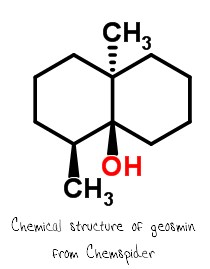The smell of rain, petrichor, is the delightful and earthy scent produced when rain falls on dry soil. The word is constructed from Greek, petra, meaning “stone”, and ichor, the fluid that flows in the veins of the gods in Greek mythology, according to Wiki.
The actual odour is aerosolised oils from plant material that has died and been adsorbed on to the surface of clay or other particles in the soil and a compound known as geosmin. Aerosols form and are carried into the air much more readily in a light summer rain than during a wintry downpour. That said, Mrs Sciencebase will attest to the smell during a severe storm we witnessed in Botswana many years ago, when a herd of elephant were seen running trunks aloft as we sat awestruck by the sky, just before the rain came.

Meanwhile, the chemistry of petrichor also boils down to that organic chemical called geosmin (named from the Greek for earth and smell), which itself has a distinct earthy flavour and aroma and is produced by a species of actinobacteria. As well as giving us the smell of summer rain it is responsible for the earthy taste of beetroot and other root vegetables such as parsnips, turnips and swedes. The molecule is a bicyclic alcohol and essentially a derivative of decalin.
Meanwhile, remember next time you’re caught in a downpour, in the words of Dolly Parton, you’ve got to put up with a little rain if you want rainbows.